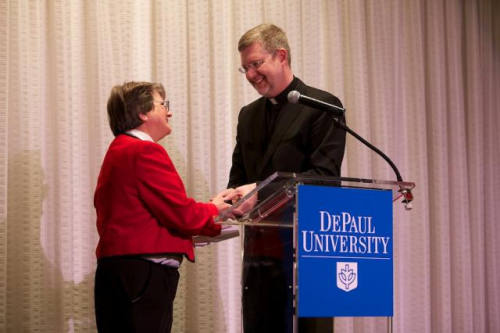Feb 15, 2011
Death Penalty Foe Sister Helen Prejean Donates Her Personal Archives to DePaul University
Death Penalty Foe Sister Helen Prejean Donates Her Personal Archives to DePaul University
Her archives include personal journals, notes from meetings, letters, speeches and other artifacts spanning a period of 30 years. The papers include her personal correspondence and manuscripts for her books “The Death of Innocents” and “Dead Man Walking”— the latter a best-selling account of Prejean’s spiritual relationship with a Louisiana death-row inmate that was the basis of an Oscar-winning 1996 film.
At a news conference, Prejean said she has written Gov. Pat Quinn urging him to sign a bill recently passed by the Illinois Legislature to abolish the death penalty. “I have a quiet kind of confidence that he will not go against the Illinois Legislature’s wave of moral integrity.” She noted that Illinois is among seven states that have recently passed or are poised to pass bills banning capital punishment. None of them, however, are in the Deep South, where 80 percent of state-sanctioned executions take place, she said.
She said DePaul’s Special Archives and Collections will be a great fit for her papers. Prejean, 71, a member of the Congregation of St. Joseph, said nuns owe St. Vincent de Paul, the university’s patron and the apostle of charity, a debt of gratitude. “St. Vincent de Paul found a way to get the nuns out of the convent and into the streets to serve the poor. He did that in 1610 and paved the way for other religious orders.”
The Rev. Dennis H. Holtschneider, C.M., DePaul’s president, who introduced her at the news conference described Prejean as “a leading light in the fight for social justice across a wide spectrum of issues, especially the movement to end capital punishment in the United States. We are deeply honored that she has chosen DePaul to preserve the records of her life’s work. We are committed to making certain that her papers will long serve as an important and accessible research tool for scholars and others interested in fighting for the rights of the condemned.”
After receiving requests from a number of other universities, Prejean said today that she also chose DePaul to archive her records in part because of DePaul’s long commitment to social justice issues. DePaul’s College of Law is home to the Center for Justice in Capital Cases (CJCC), headed by Andrea Lyon, professor of law and one of the nation’s leading death-penalty attorneys.
The Prejean archive will benefit DePaul College of Law students participating in the clinical program associated with the CJCC. The clinic provides students a yearlong opportunity to study the complexities of this increasingly controversial form of punishment, to work on trial and post-conviction capital cases, and to examine the impact of capital punishment on society.
A criminal defense attorney, Lyon has spent decades representing numerous defendants in capital cases. Lyon’s work was a key factor in the decision to select DePaul as the site of a 2003 announcement by then-Illinois Gov. George Ryan that he was pardoning four men who had spent years on death row.
“I am grateful for this day, and I am grateful to Susanne Dumbleton,” said Prejean. She noted that Dumbleton, a DePaul professor and former dean of DePaul’s School for New Learning, suggested that she house her collection at DePaul. Dumbleton noticed the collection during a visit to Prejean’s residence in New Orleans while working on a book about three extraordinary women crusaders for social justice, including Prejean.
Dumbleton alerted the Rev. Edward R. Udovic, C.M., secretary of DePaul University and senior executive for University Mission, to Prejean’s interest in exploring DePaul as a possible site to house her archive. Father Udovic represented the university in the negotiations with Prejean and her religious order that led to the donation of her personal papers to the university.
“DePaul’s archives on social justice movements rooted in the Catholic religious tradition are rapidly evolving into a world-class resource,” said Udovic. “The addition of Sister Helen’s papers greatly enhances the breadth and depth of DePaul’s collection.” He noted that the collection already includes a broad array of social justice-related materials, including the Berrigan-McAlister collection, which gives insights into the history of the Catholic peace movement led by activists the late Phillip Berrigan, a former Catholic priest, his wife Elizabeth McAlister and his brother Daniel Berrigan, S.J.; and an important collection of historic materials on Oscar Romero, the martyred archbishop of San Salvador.
About DePaul
With more than 25,000 students, DePaul University is the largest Catholic university in the United States and the eighth-largest private, nonprofit university in the nation. DePaul offers approximately 275 graduate and undergraduate programs of study on two Chicago campuses and four suburban campuses and at several international locations. Founded in 1898, DePaul remains committed to providing a quality education through personal attention to students from a wide range of backgrounds. For more information, visit DePaul's webpage.

